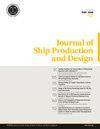Underwater Noise Concerns: How Can the Maritime Industry React?
IF 0.5
4区 工程技术
Q4 ENGINEERING, MARINE
引用次数: 0
Abstract
In addition to pressure to improve energy efficiency, the maritime industry may soon face demands to reduce underwater noise from shipping. This is illustrated by a large number of studies being reviewed by UN panels to bring clarity to the subject. In this paper, the studies relevant to shipping and shipbuilding are reviewed. From this review the progress of the consultative process, possible shortcomings, and potential collaborative actions beneficial to the marine industry are identified. Key revelations include inconsistencies in the way the scientific community represents shipping noise and areas where more focus is needed to ensure resilience. Furthermore, several future research focus topics are suggested in order to address these issues. This paper does not argue for or against underwater noise being viewed as harmful to marine life; it only serves to review the current consultative process and how the maritime industry could benefit from participating. Stakeholders in the maritime industry are currently facing ever-increasing pressure from national and international regulators, geopolitical uncertainty and financial woes. While this is a concern for the industry, its desire for resilience is also the main driver of technical innovation. From an engineering perspective, one of the main reasons for investment in novel technical solutions is the demand for better energy efficiency and reduced pollution by the International Maritime Organization (IMO 2011). Reasonably clear targets have been formulated by the IMO covering energy efficiency, air and water pollution. This allows the devising of innovation road maps for technological developments which will enable meeting these targets. Underwater noise from shipping activities is not an unknown subject, especially to the defence sector. However, when addressing concerns about underwater noise and impact on the environment, there are no clear guidelines what limits for this noise should be applied and how future rules and regulations may impact how ships are designed. It is nevertheless necessary for designers and yards to prepare in order to not be caught unaware.水下噪音问题:海运业如何应对?
除了提高能源效率的压力外,海事行业可能很快就会面临减少航运水下噪音的需求。联合国小组正在审查大量研究,以澄清这一问题,这就说明了这一点。本文对航运和造船的相关研究进行了综述。通过这次审查,确定了协商进程的进展、可能存在的不足以及有利于海洋工业的潜在合作行动。关键的披露包括科学界代表航运噪音的方式不一致,以及需要更多关注以确保恢复力的领域。此外,为了解决这些问题,还提出了几个未来的研究重点。本文并不赞成或反对将水下噪音视为对海洋生物有害;它只是用来审查目前的协商进程,以及海运业如何从参与中受益。海事行业的利益相关者目前面临着来自国家和国际监管机构、地缘政治不确定性和金融困境的日益增长的压力。虽然这是该行业关注的问题,但其对韧性的渴望也是技术创新的主要驱动力。从工程角度来看,投资于新型技术解决方案的主要原因之一是国际海事组织(IMO 2011)对提高能源效率和减少污染的需求。海事组织制定了相当明确的目标,涵盖能源效率、空气和水污染。这使得能够为技术发展制定创新路线图,从而实现这些目标。航运活动产生的水下噪音不是一个未知的问题,尤其是对国防部门来说。然而,在解决人们对水下噪音和环境影响的担忧时,没有明确的指导方针,应该对这种噪音施加什么限制,以及未来的规则和条例可能如何影响船舶的设计。然而,设计师和船厂有必要做好准备,以免被发现不知情。
本文章由计算机程序翻译,如有差异,请以英文原文为准。
求助全文
约1分钟内获得全文
求助全文
来源期刊

Journal of Ship Production and Design
ENGINEERING, MARINE-
CiteScore
1.10
自引率
0.00%
发文量
19
期刊介绍:
Original and timely technical papers addressing problems of shipyard techniques and production of merchant and naval ships appear in this quarterly publication. Since its inception, the Journal of Ship Production and Design (formerly the Journal of Ship Production) has been a forum for peer-reviewed, professionally edited papers from academic and industry sources. As such it has influenced the worldwide development of ship production engineering as a fully qualified professional discipline. The expanded scope seeks papers in additional areas, specifically ship design, including design for production, plus other marine technology topics, such as ship operations, shipping economics, and safety. Each issue contains a well-rounded selection of technical papers relevant to marine professionals.
 求助内容:
求助内容: 应助结果提醒方式:
应助结果提醒方式:


